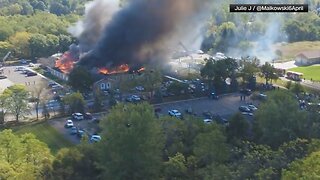Premium Only Content

Episode 3212: Holy Remembrance: The Danger of Forgetfulness
www.catholic-reboot.com
Nightly Zoom Coordinates for Rosary:
Meeting ID: 865 8978 0399
Passcode: Wjjv4960!
Speak Lord for your Servant is Listening
Book Recommendation of the Day
Homilies on the Epistle to the Romans
You can find The Homilies of S. John Chrysostom on the Epistle of St. Paul the Apostle to the Romans on Internet Archive. It’s extensive and rich in theological depth.
Holy Remembrance: The Danger of Forgetfulness and
the Discipline of
Why Forgetfulness is Dangerous
When most Catholics think of sin, they think of pride, lust, greed, or anger. But the Desert Fathers identified something more subtle and equally dangerous: forgetfulness of God.
Forgetfulness was not simply losing memory it was spiritual negligence. It was allowing the mind and heart to drift from the remembrance of God. The Fathers saw this as the entry point of sin: once the soul forgets God, the devil has free access.
This is striking for us today, because we live in an age where distraction and forgetfulness are the norm. Technology, noise, and busyness scatter our minds so that hours sometimes days pass without a single thought of eternity. The Fathers’ warnings are not just ancient wisdom, but a mirror for our own times.
Segment 1: What the Desert Fathers Said
Evagrius of Pontus
Evagrius identified forgetfulness (lēthē) as one of the great enemies of the soul:
“Forgetfulness extinguishes knowledge; without memory of God, the heart becomes a dwelling for demons.”
For Evagrius, remembrance of God (mnēmē Theou) was essential for prayer. A distracted, forgetful mind could not ascend to God.
Abba Isaiah
Abba Isaiah gave the remedy in a simple maxim:
“Keep the remembrance of God always, and the enemy will not find entrance into your soul.”
Remembrance was like a wall protecting the soul. Demons could tempt, but they found no foothold in a heart fixed on God.
Abba Anthony the Great
Anthony taught his monks to recite Scripture constantly, especially the Psalms, as a way to train the mind never to drift. He insisted that vigilance of memory was part of vigilance of the soul.
For the Fathers, remembrance was not a passing thought but a discipline an intentional effort to recollect God in every moment, in every action.
Segment 2: Why This is Urgently Relevant Today
1. A Culture of Distraction
Smartphones, social media, and endless entertainment are designed to scatter our attention. The average Catholic today checks their phone more often than they lift their heart to God. The Fathers would see this as fertile soil for forgetfulness.
2. Secular Slogans
Our culture says: “Live in the moment,” “Don’t worry about tomorrow,” “Be present.” But without reference to God, this becomes empty hedonism. The Desert Fathers would say: live in the moment but with remembrance of God.
3. Spiritual Indifference
Forgetfulness leads to indifference. When God is forgotten, His commandments are neglected, prayer is postponed, and conscience grows dull. A soul that forgets God slips easily into sin.
4. Even Within the Church
Distraction has entered Catholic life itself. Liturgies become noisy and rushed, devotions are neglected, and many Catholics go from Sunday to Sunday without recollecting God during the week. The Fathers would warn us: this is forgetfulness masquerading as faith.
Segment 3: Remedies from the Desert Tradition
The Desert Fathers did not despair. They gave simple, concrete remedies to overcome forgetfulness:
1. The Jesus Prayer
Constantly repeating: “Lord Jesus Christ, Son of God, have mercy on me a sinner.”
This prayer engraves the name of Jesus on the heart. It is not mere repetition but a safeguard, pulling the mind back to God each time it drifts.
2. Scripture as Memory
The Fathers memorized Psalms and verses so they could recall them throughout the day. Psalm 118:11 says: “Thy word have I hidden in my heart, that I might not sin against Thee.”
Practical application: Catholics today should memorize short verses “Jesus, remember me,” or “The Lord is my shepherd” to recall God in moments of distraction.
3. Signs and Gestures
The Sign of the Cross was used by the Fathers as a constant act of remembrance. Every time we bless ourselves, we recall Christ’s sacrifice. In this way, even the body becomes a guardian against forgetfulness.
4. Memento Mori
The Fathers often reflected on death, not morbidly, but as a remedy against spiritual negligence. Remembering death and judgment made them vigilant. Abba Macarius said:
“If we keep death before our eyes every day, we will never sin.”
5. Fixed Hours of Prayer
The Desert Fathers prayed at set times throughout the day. This discipline evolved into the Divine Office, sanctifying the hours. Every few hours, the Fathers would stop and remember God. This broke the chain of forgetfulness and kept the soul recollected.
Segment 4: Traditional Catholic Perspective and Application
The Desert Fathers’ call to remembrance is deeply woven into Catholic Tradition:
• The Rosary — a school of remembrance. Each decade recalls a mystery of Christ and Our Lady, teaching us to never forget the Gospel.
• The Divine Office / Breviary — sanctifies the day with continual remembrance, echoing the Fathers’ fixed hours of prayer.
• The Traditional Latin Mass — built on remembrance: “Hoc facite in meam commemorationem” — “Do this in commemoration of Me.”
• Sacramentals — holy water, medals, scapulars, and crucifixes serve as visible reminders of God’s presence amid daily life.
For us today:
• Begin the day with a morning offering to consecrate the hours to God.
• Carry a short prayer on your lips whenever idle moments arise.
• Turn distractions into reminders — every time the phone buzzes, pray briefly: “Lord, remember me.”
Conclusion: Holy Remembrance as the Antidote to Forgetfulness
Forgetfulness, the Desert Fathers warned, is not harmless it is spiritual death. A soul that forgets God opens itself to the enemy. But holy remembrance transforms every moment into prayer.
• Evagrius told us: without memory of God, the heart becomes a dwelling place for demons.
• Isaiah promised: if you keep remembrance, the enemy finds no entrance.
• The Church reminds us at every Mass: “Do this in memory of Me.”
The path to holiness is not always found in great deeds but in small acts of remembrance a prayer, a verse, a gesture that keep God present in the soul.
As Abba Isaiah said:
“Keep the remembrance of God always, and the enemy will not find entrance into your soul.”
Epistle – Galatians 3:16–22
"To Abraham were the promises made, and to his seed. He saith not: And to his seeds, as of many; but as of one: And to thy seed, which is Christ... For if there had been a law given which could give life, verily justice should have been by the law. But the scripture hath concluded all under sin, that the promise, by the faith of Jesus Christ, might be given to them that believe."
Reflection on the Epistle
St. Paul teaches that God’s promise to Abraham is fulfilled in Christ, the one Seed through whom salvation comes. The Mosaic Law was not a failure, but a preparation: it revealed sin and pointed the way to the Redeemer. Yet salvation could never be earned through the Law alone it is a gift, fulfilled in Christ and received through faith.
From a traditional Catholic perspective, this is a call to guard against reducing our faith to external observances or mere cultural identity. Tradition, sacraments, fasting, and devotions are essential, but they must be lived as participation in Christ, not as ends in themselves. The promise is fulfilled in Him alone.
St. John Chrysostom embodied this teaching in his preaching. He constantly reminded Christians that ceremonies and laws without conversion of heart lead nowhere. “Do you fast?” he asked, “Then show it by your works: by not oppressing your brother, by not judging others, by not storing up anger.” For him, faith was always living, active, and fruitful in love.
Gospel – Luke 17:11–19
"And it came to pass, as he was going to Jerusalem, he passed through the midst of Samaria and Galilee. And as he entered into a certain town, there met him ten men that were lepers... And one of them, when he saw that he was made clean, went back, with a loud voice glorifying God; and he fell on his face before his feet, giving thanks. And this was a Samaritan... And he said to him: Arise, go thy way; for thy faith hath made thee whole."
Reflection on the Gospel
Christ heals ten lepers, but only one a Samaritan returns to give thanks. The others received physical healing, but they lacked gratitude, and so their faith remained incomplete. The Samaritan not only received cleansing of the body but also a deeper blessing: wholeness of soul.
This Gospel is a warning against ingratitude. How often do we receive God’s gifts the sacraments, our health, our daily bread and fail to return thanks? Eucharist itself means thanksgiving. To live a Eucharistic life is to live gratefully, always returning to Christ with praise.
St. John Chrysostom preached fiercely against ingratitude, teaching that it is not merely a fault but a root of spiritual blindness. He said: “It is not so much sinning that plunges men into ruin, as much as forgetting blessings.” Gratitude, by contrast, opens the soul to further grace. The Samaritan teaches us that thanksgiving is the completion of faith.
Feast of St. John Chrysostom
Born in Antioch around 347, St. John Chrysostom became one of the greatest preachers of the early Church. His eloquence in expounding Scripture earned him the name Chrysostom the Golden Mouth. As Patriarch of Constantinople, he preached fearlessly against corruption in both Church and state, calling all people to repentance and fidelity.
For his boldness, he was exiled by the Empress Eudoxia and eventually died in banishment in 407. His last words, “Glory be to God for all things,” echo today’s Gospel: gratitude even in suffering, thanksgiving even in trial. He remains a model for preachers, a defender of Catholic tradition, and a voice still golden for us today.
Application for Today
• Live by faith in Christ: Do not rest in empty observances; cling to Christ, the fulfillment of the promise.
• Practice daily gratitude: Be like the Samaritan, not the nine. After Communion, after blessings, return thanks to God in prayer.
• Speak boldly: Like St. John Chrysostom, be willing to proclaim the truth with courage, even if it costs you comfort or worldly favor.
• Glorify God in trials: In exile, Chrysostom’s final words were thanksgiving. Let us, too, glorify God in all circumstances.
Conclusionary Prayer
O God, who gavest blessed John Chrysostom to Thy Church as a preacher of truth and a model of pastoral zeal, grant that we may live by faith in Christ, return thanks in all things, and endure trials with courage. Through his intercession, may we glorify Thee with our lips and our lives, and so be made whole like the Samaritan who gave thanks.
St. John Chrysostom, pray for us.
Sacred Heart of Jesus, have mercy on us.
Immaculate Heart of Mary, intercede for us.
Episode Theme:
The 13th Sunday after Pentecost teaches us that salvation is in Christ alone, received in faith and completed in gratitude. St. John Chrysostom shows us how to live this truth with courage, eloquence, and thanksgiving even unto exile and death.
-
 LIVE
LIVE
The Rubin Report
1 hour agoCNN Liberals Go Silent as Guest Points Out Fact After Fact on Left Wing Violence
2,098 watching -
 LIVE
LIVE
MattMorseTV
35 minutes ago🔴COURT DATE for Kirk's ASSASSIN.🔴
233 watching -

Nikko Ortiz
1 hour agoChurch Shooting And Arson Attack In Michigan - Rumble LIVE
8.24K2 -
 LIVE
LIVE
Benny Johnson
1 hour agoChristianity Under Attack: Trump Declares 'Epidemic of Violence' on Christians As Church Shot,Burned
5,615 watching -
 1:00:21
1:00:21
VINCE
2 hours agoThe Left's "Mostly Peaceful" Terrorists + Guest Eric Trump | Episode 135 - 09/29/25
173K78 -
 LIVE
LIVE
LFA TV
14 hours agoBREAKING NEWS ALL DAY! | MONDAY 9/29/25
4,614 watching -
 LIVE
LIVE
The Big Mig™
2 hours agoPesticides & Herbicides, The Ugly Truth w/ Zen Honeycutt
4,573 watching -
 LIVE
LIVE
Bannons War Room
7 months agoWarRoom Live
14,134 watching -
 LIVE
LIVE
LadyDesireeMusic
1 hour agoLive Piano & Convo | Support a Culture Change | Make Ladies Great Again
123 watching -
 35:58
35:58
Mike Rowe
3 days agoWhat About Jimmy Kimmel? | Hot Takes
19.5K35